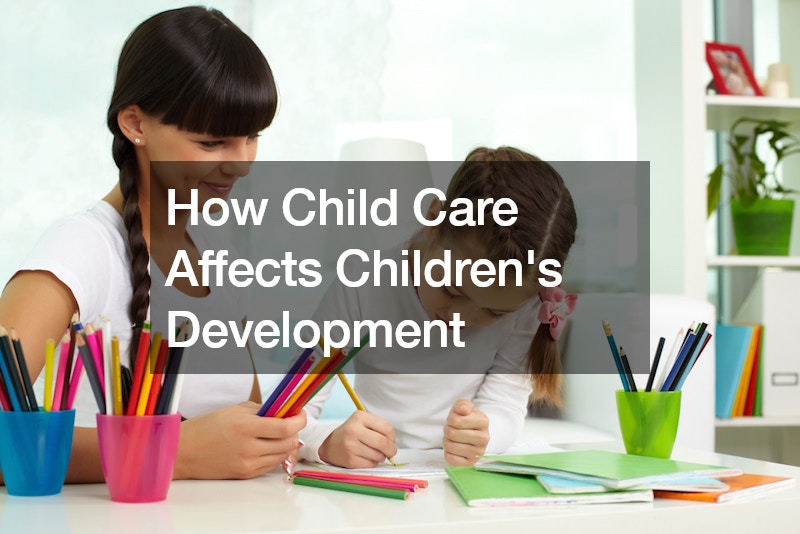Child care plays a significant role in shaping a child’s development, encompassing various aspects of their physical, cognitive, social, and emotional growth. From health and safety considerations to providing nurturing environments, the impact of child care extends far beyond mere supervision. In this article, we’ll delve into how child care affects children’s development and explore the crucial elements that contribute to their overall well-being.
Ensuring Health and Safety:
One of the foundational aspects of child care is maintaining a clean and safe environment. Just as highlighted in the transcript, prioritizing health and safety measures is essential for protecting children from harm and providing peace of mind to parents and caregivers. Regular cleaning, disinfecting surfaces, and enforcing proper handwashing procedures are fundamental practices in any child care setting. Moreover, having protocols for managing illnesses and emergencies, such as separating sick children and ensuring physical safety, ensures a secure environment conducive to growth and learning.
Promoting Physical Well-being:
Child care facilities play a crucial role in promoting physical well-being through nutritious meals and snacks. Providing a balanced diet rich in fruits, vegetables, lean proteins, and whole grains not only supports children’s physical health but also enhances their cognitive function and overall development. Additionally, being mindful of food allergies and sensitivities underscores the importance of catering to individual dietary needs, ensuring that every child receives adequate nourishment for optimal growth.
Supporting Cognitive Development:
Quality child care programs contribute significantly to cognitive development by offering stimulating environments that encourage exploration, creativity, and critical thinking. Through age-appropriate activities, educational games, and exposure to diverse learning materials, children in child care settings have the opportunity to develop essential cognitive skills, such as problem-solving, language acquisition, and mathematical reasoning. Moreover, engaging interactions with caregivers and peers foster intellectual curiosity and lay the foundation for lifelong learning.
Fostering Social Interaction:
Child care settings serve as valuable social environments where children learn to interact with peers and develop important social skills. Encouraging positive social interactions, cooperation, and empathy cultivates emotional intelligence and enhances children’s ability to form meaningful relationships. Moreover, group activities, collaborative play, and structured routines promote socialization and teach children valuable lessons in communication, sharing, and conflict resolution, preparing them for future social interactions and relationships.
Nurturing Emotional Well-being:
In addition to physical and cognitive development, child care plays a pivotal role in nurturing children’s emotional well-being. Creating a supportive and nurturing environment where children feel safe, valued, and emotionally secure is essential for promoting positive mental health outcomes. Through attentive caregiving, responsive interactions, and emotional support, child care providers help children develop resilience, self-confidence, and a healthy sense of self-esteem, laying the groundwork for positive emotional growth and well-being.
Emotional Regulation and Social Skills:
Child care environments serve as critical arenas for the development of emotional regulation and social skills. Interacting with peers in group settings helps children learn to navigate social dynamics, negotiate conflicts, and develop empathy and cooperation. Caregivers play a crucial role in modeling positive social behaviors, teaching conflict resolution strategies, and providing emotional support and validation. Through consistent and nurturing interactions, children learn to express their emotions effectively, regulate their impulses, and develop healthy relationships with others.
Preparation for School Readiness:
Quality child care programs play a pivotal role in preparing children for success in school and beyond. By offering developmentally appropriate activities, fostering pre-academic skills, and promoting independence and self-help skills, child care settings lay the groundwork for future academic achievement. Moreover, exposure to structured routines, following directions, and participating in group activities helps children develop essential school readiness skills, such as attention, concentration, and self-regulation, setting them on a path toward academic success.
Continuity of Care and Stability:
For many children, child care serves as a consistent and stable environment amidst transitions and changes in their lives. Reliable and nurturing caregiving relationships provide children with a sense of security, trust, and predictability, which are essential for healthy development. Quality child care programs prioritize continuity of care by ensuring consistent staffing, maintaining familiar routines, and offering a nurturing and supportive environment where children feel safe to explore and grow.
Holistic Development and Individualized Support:
Effective child care programs recognize the uniqueness of each child and strive to support their holistic development through individualized care and tailored interventions. By observing children’s interests, strengths, and areas for growth, caregivers can adapt their approaches and provide personalized support that meets each child’s needs. Whether through one-on-one interactions, small group activities, or differentiated instruction, child care providers create inclusive environments where every child can thrive and reach their full potential.
Community Engagement and Advocacy:
Child care settings play an integral role in fostering community engagement and advocating for policies that support early childhood development. By partnering with local organizations, advocating for resources and funding, and raising awareness about the importance of quality child care, providers contribute to the well-being of children and families beyond the confines of their centers. Through collective action and advocacy efforts, child care professionals can drive positive change and create a brighter future for all children.
Conclusion:
In conclusion, child care significantly impacts children’s development across various domains, including health, cognition, socialization, and emotional well-being. By prioritizing health and safety measures, providing nutritious meals, fostering cognitive development, facilitating social interaction, and nurturing emotional well-being, child care settings play a crucial role in shaping the trajectory of children’s lives. Recognizing the importance of quality child care and investing in supportive, enriching environments are essential steps toward ensuring the optimal development and well-being of our youngest learners.
.


